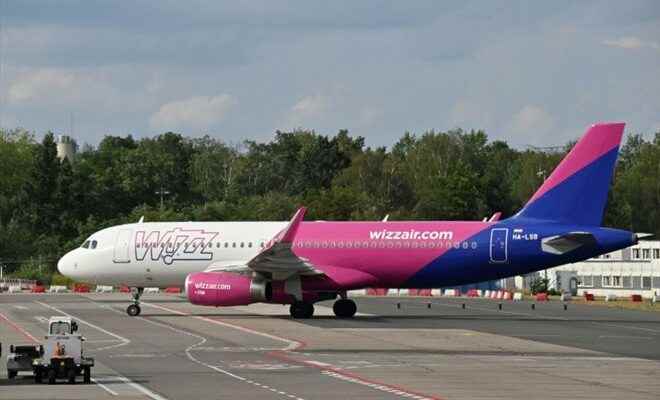Ryanair planes at Charleroi airport on June 24, 2022 in Belgium (AFP / Kenzo TRIBOUILLARD)
Low-cost airlines, driving an extremely sustained recovery in air traffic, have almost all returned to, or even exceeded, their pre-crisis levels this summer, riding on strong demand for leisure destinations in Europe.
Irish Ryanair, Spanish Volotea or Hungarian Wizz Air are in good shape: the main low-cost companies have reached 91% of their 2019 levels, when traditional companies are only at 79% according to data from ‘Eurocontrol, the policeman of the European sky.
“Low-cost companies have an activity mainly focused on leisure flights to European cities, for which demand has been very strong this summer”, analyzes Arnaud Aymé consultant at Sia Partners. “Very quickly, they were able to relaunch at full speed lines less constrained by health restrictions.”

A Volotea plane in Lille, August 22, 2018 (AFP/Archives/PHILIPPE HUGUEN)
The Ryanair group, which also includes Buzz, Lauda and Malta Air, transported nearly 17 million passengers in July alone, almost as many as Air France since January. It shows an increase in the number of flights made by 15% in the single week of August 11 to 17 compared to the same dates in 2019, providing more than 3,000 daily flights.
Wizz Air, a fast-growing very low-cost airline, increased its offer by 20% over the same period.
The only exception is the British company easyJet, which has not returned to its 2019 levels, at 86%, suffering more from “the weak recovery in business travel” which constitutes part of its activity, according to Mr. Aymé.
– Always attractive prices –
These low-cost airlines are widely prized for their unbeatable prices, despite a major price hike this summer.
In July, with soaring kerosene prices and a sharp increase in demand, all companies combined, ticket prices jumped 43.5% in France compared to July 2021, and even 54.5% on average. – mail from France to European destinations.
On the side of Ryanair, it was already announced at the beginning of August that the era of plane tickets sold off at 10 euros was well over.

A plane from the Hungarian low-cost company Wizz Air, on August 24, 2020 in Schoenefeld, near Berlin (AFP/Archives/John MACDOUGALL)
But “the inevitable increase in their prices will not make them less profitable”, assures Marc Ivaldi, specialist in air transport at the School of Advanced Studies in Social Sciences in Toulouse (EHESS). “These companies will in any case remain cheaper than the traditional companies, which have also revised their prices upwards for the same reasons.”
Especially since the main low-cost companies have weathered the health crisis with less difficulty than their traditional competitors.
– Marginal disturbances –
“Most of the low-cost airlines were well equipped financially to get through the crisis. They managed to gain new market share by taking over routes abandoned by traditional airlines and by continuing to invest in new aircraft,” says Arnaud. Aymé, citing the example of Transavia France, a subsidiary of Air France, which has extended its fleet of aircraft and taken over lines abandoned by the parent company.
The market share of low-cost in Europe reached 47.3% in 2022, against 41.5% in 2019, according to the research office CAPA, a record increase.
These companies have also been “relatively spared” by the many tensions that have arisen since the opening of the high summer season: several European airports have experienced malfunctions, between lack of staff and social unrest, causing cancellations, delays or loss of luggage.
Ryanair, Volotea, easyJet or Transavia France have certainly been affected by strikes by some of their teams demanding better working conditions and higher salaries.
But these had “a marginal impact” on the activity of the companies, according to Arnaud Aymé. “On wage demands and working conditions, the unions of low-cost companies won their case,” he analyzes.
Experts also believe that staff shortages should be less severe at the start of the school year, firstly due to the expected drop in traffic in the fall, but also thanks to new bursts of recruitment, like those launched by Ryanair in major European capitals or easyJet in France.
© 2022 AFP
Did you like this article ? Share it with your friends with the buttons below.




